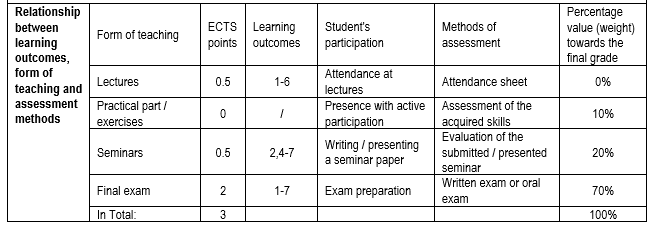Goal of the course is to provide students with knowledge about etiology and mechanisms of diseases origin,with their clinical manifestations, diagnosticprocedures,basic laboratory and instrumentalexaminationand principles of treatment.Give students better understanding of patients’ problems that they encounter in their everyday work. The acquired knowledge will enable them to participate in diagnostic analysis of patients,monitoring therapy procedures and treatment outcomes, also more independence in their work.
Diseases of thecardiovascularsystem(coronary artery disease;rhythmic disorders,electrostimulation;shock;sudden death,cardiopulmonary resuscitation;pulmonary heart disease;diseases of arteries and veins).
Diseases of respiratory system (diagnostic methods;functional disorders;cough,haemoptysis;bronchialasthma;COPD;acute and chronic respiratory insufficiency;infections of the respiratory system;lungcancer;pleural disease;ARDS;tuberculosis).
Diseases of digestive system(diagnostic methods;vomiting,diarrhoea, constipation,malabsorption,bleeding,icterus, ascites;diseases of oesophagus;GERD; gastritis,peptic ulcer, Zollinger-Ellisonsyndrome;inflammatory bowel disease; irritable bowel syndrome; diverticulosis;vascularbowel disorder; anorectaldiseases;tumours in thealimentary tract;gallbladder disease;pancreas diseases;tumours on the pancreasandhepatobiliarysystem;cirrhosis,portalhypertension).
Clinical immunology andrheumatology(allergic reactions;collagenases;seronegativearthritis;gout;degenerativediseases of the joints; metabolic bone diseases).
Diseases of the endocrine system (laboratory diagnostics; diseases of thehypothalamus and the pituitary;diseases of the thyroid,adrenal andparathyroid glands;clinical usage of glucocorticoid; diabetes).
Diseases of the bloodstream and the blood-forming organs(hematopoieticsystem;anaemia;agranulocytosis;polycythaemia vera; acute and chronicleukaemia; malignantlymphoma; multiple myeloma;diseases caused by disorders of the haemostasis).
Diseases of the kidneysand urinary tracts(examination;diseases of glomeruli;nephrotic syndrome; tubulointerstitial diseases of the kidneys; infections of the urinary system;tuberculosis;kidney stones;obstruction of theurinarytract;acute and chronic kidney failure;dialysis and transplantation).
Obavezna literatura:
1. Hadžić N. i sur.: Priručnik interne medicine, Školska knjiga, Zagreb 1989.
Dopunska literatura:
- Vrhovac B, Jakšić B, Reiner Ž, Vucelić B. Interna medicina. Zagreb: Medicinska naklada; 2008.
- Čučević B. Izabrana poglavlja iz pulmologije – nastavni tekstovi. Zagreb: VZŠ; 2002.
- Morović-Vergles J. Izabrana poglavlja iz kliničke imunologije, reumatologije i alergologije – nastavni tekstovi. Zagreb: VZŠ; 2002.
Upon completion of this course, students will be able to:
1. identify the most significant diseases of internal organs and organ systems;
2. critically evaluate the pathophysiological mechanisms of internal organ disease;
3. assess the leading symptoms and signs of the most significant diseases of internal organs and organ systems;
4. valorize disease characteristics important in assessing the health status of patients and providing health care;
5. support differential diagnostic possibilities based on clinical symptoms and clinical presentation;
6. recommend further diagnostic procedures and basic therapy;
7. evaluate the skills of drug administration in collaboration with a medical doctor.



